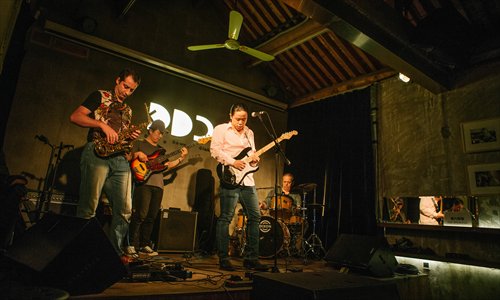Where are Beijing's livehouses going?
Closedown of several music venues in the capital raises concerns

The Hormones, a band consisting of five women from Chengdu, Sichuan Province, playing at the School Bar in Dongcheng district on September 4. Photo: Li Hao/GT
Despite the heavy rain outside, the small livehouse was full of people rocking back and forth to the beat of electronica music. "Awesome! Awesome!" could be heard from an audience of more than 70 foreigners and Chinese.
Ma Liang, a 28-year-old video producer in Beijing, couldn't remember how many times he had been to live shows at Beijing's many livehouses.
The performance of the Hormones - a five-woman band from Sichuan Province - at the School Bar that night did not disappoint him.
"They just stirred up the stage!" Ma said as he stood close to the 20-square-meter stage.
Many people like Ma are attracted by the particular charm of Beijing's livehouses. Uniquely decorated, they are casual venues to meet like-minded friends, allow patrons to sit very close to performers, and, more importantly, are a way to find an emotional release through live music.
However, while some livehouses are as hot as ever, others are experiencing a cold winter. Last month, the Mako Livehouse in Shuangjing, Chaoyang district, closed down due to the area's high rent.
The news was like a bomb that stirred up waves of sentimentalism among performers and audiences.
Mako isn't the only venue that has closed. Since last year, several venues like XP, Jiangjinjiu and Zajia Lab, have shut their doors for various reasons.
Despite this dire outlook, many musicians and audiences are still optimistic about the future development of the city's livehouses.

The Night Crawler, a Blues band, playing at the Dust Dawn Club(DDC) on September 4. Photo: Li Hao/GT
Facing problems
Shao Qiang, music director of the 700-squaremeter Mako Livehouse, did not expect to be forced to shut down his venue so suddenly.
A notice from his landlord on August 12 told him to move out the very next day.
"There is no other way [to continue with the club]. I watched it being built from scratch. But now I have to go due to the rising rental," said Shao.
Over the last six years, it has held more than 1,000 live shows. Sometimes, the venue was jam-packed with an audience of over 800 people. Some were forced to stand outside to listen to the music, but without any complaint, recalled Shao.
Then last year, the rent started to increase. From 1.9 yuan ($0.29) per square meter every day when the club was first started in 2009, to 3.5 yuan when the contract came up for renewal. The pressure of running the club continued to grow, and this year, it went up to 4.5 yuan.
Shao said the exorbitant rent this year forced its closure.
"At least 70 percent of this income will go toward rental. It is very hard to make a profit."
Liu Fei, co-founder of the School Bar in Wudaoying Hutong, Dongcheng district, said that rising rent is a problem all livehouses face.
"At an average of 40 yuan a ticket for shows, drink sales need to reach at least 4,000 yuan every day before we can make ends meet," said Liu.
Dan Tylor, singer and songwriter of the Harridans, a British band based in Beijing, has performed at Mako about 10 times over the past two years. "[It was] bad news in the foreign musicians' world [here]. Everybody was upset," said Tylor.
He said he liked Mako because it was big with good acoustics and was very open to putting on a lot of different music.
Tylor added that location is very important.
"The problem is that it was too far away. There isn't a lot of music in Shuangjing," he said.
"Gulou has become a cultural haven in Beijing and there are a lot of livehouses, bars and restaurants for young people who love culture and arts. I think if Mako had been here in Gulou, it would have been amazing."
Finding the way out
Besides rising rent and bad locations, there are also lots of internal problems plaguing livehouses, such as poor management and the inability to support and nurture new bands.
Liu pointed out that many livehouse owners have a passion for indie music, but lack business sense, such as lacking a unique cultural core.
"Their sound equipment may be very good, but without a unique culture they end up just providing a venue."
He said that to present a unique cultural core, decorations, music styles, the arrangement of themed shows in a week or month, and promotions such as posters, should be part of an organic whole.
Liu often visited livehouses in Japan where livehouse culture began. He was deeply impressed by the standardization of the industry there.
"No matter how small a venue may be, the stage always takes up a large area. They also have very detailed guidelines when it comes to room size, decor and equipment," he said.
For Liu, livehouses are not only about a venue. They should be carriers of culture. As for the School Bar, the slogan is "Bad Education," representing the cultural core.
"It is just like a 'school' where young bands can develop on our stage and people with independent thinking who like rock music can play," said Liu.
Despite the recent closures, new venues are always popping up, like Dust Dawn Club (DDC) in Dongcheng district.
Located in a quiet hutong area, the club is in a courtyard, which stands in contrast with the modern style of the shows.
Even though DDC that focuses on crossover music was founded last year, it has attracted a lot of foreign and Chinese music lovers and even won the "Best Live Music Venue" from That's Beijing Readers' Choice in 2015.
DDC founder Zhang Jincan feels that finding, cultivating and supporting new bands is very important.
"Bands are the most important. But many livehouses are not like this [having the resources to scout for good bands]. This is an ecosystem. You have to make it sustainable. It may take five to 10 years for a young band to make it big, but they will eventually move on, so you still need new blood coming in," Zhang explained.
He added that his club helps new bands plan shows, first starting with small venues then moving on to larger ones.
"In this way, more new bands will be willing to come to our venue, and even if they become famous, they will not forget that they grew up here and will be willing to come back," said Zhang.
Agreeing with Zhang, Tylor said that they like venues that can provide them a space to practice, support them and also are open to different styles of music.
Needing more acceptance
In the eyes of Nevin Domer, a former employee at XP, there is still hope for the music scene in Beijing.
"In the 10 years that I've been involved with the Beijing music scene, I've only seen it get better and better. There are way more bands in Beijing playing more diverse styles of music. And while some venues are closing down at a seemingly alarming rate, there are still plenty of places to play with new spaces opening up," Domer said.
The fast-developing music scene just can not stop as more and more people gradually accept and like indie music, Domer pointed out.
Domer feels that the audience in Beijing has grown exponentially in size but also in quality.
In 2005, getting over 100 people out to a show was a pretty big deal. Now bands like Hedgehog, Wang Wen and Carsick Cars will sell out over 800 tickets at Yugong Yishan, he said.
"The audience themselves is also way more sophisticated than before with a more diverse and nuanced musical taste," he said.
Attending live shows over the past 10 years, Ma has also noticed an increasing number of bands and audiences including Chinese and foreigners.
"The market is expanding. Livehouses are gradually becoming places for cultural entertainment for the masses," said Ma.
Agreeing with Domer, he also thought that the wave of closures is a natural process of survival of the fittest.
"It enhances the survivability of the winners and makes audiences cherish them even more, which might be beneficial to the market," said Ma.
Liu said that there are still some people with a prejudice against indie music, although the music scene is much better than 10 years ago.
"Rock music is very diverse and does not always involve rebellion or danger, and many of the people coming to our bar now are independent thinkers," he said.
"I believe that in the following decade, going to livehouses will be a mainstream part of the culture just like watching films. It will become the lifestyle of many people," he said.